#marguerite radclyffe-hall
Explore tagged Tumblr posts
Text
Sooo you're used to it by now, here's my 4th special pride post, and today we're going to talk about
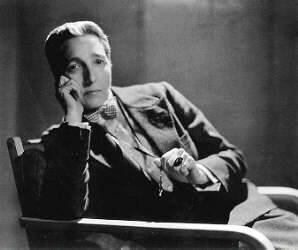
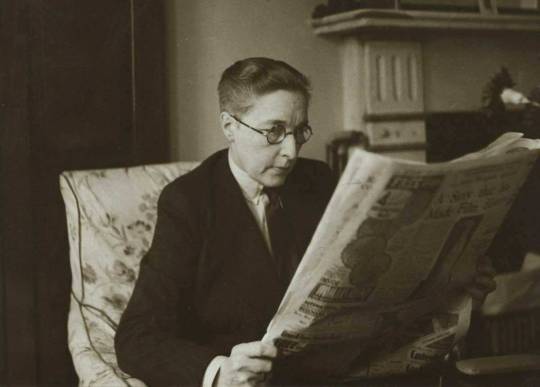
Marguerite Radclyffe-Hall !
Marguerite was born in 1880 and died in 1943. She was a British poet and writer, author of "The Well of Loneliness", a revolutionary and very important novel in lesbian literature. She never tried to hide her homosexuality.
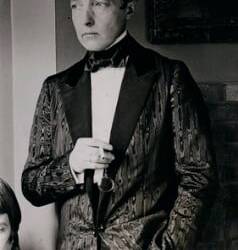
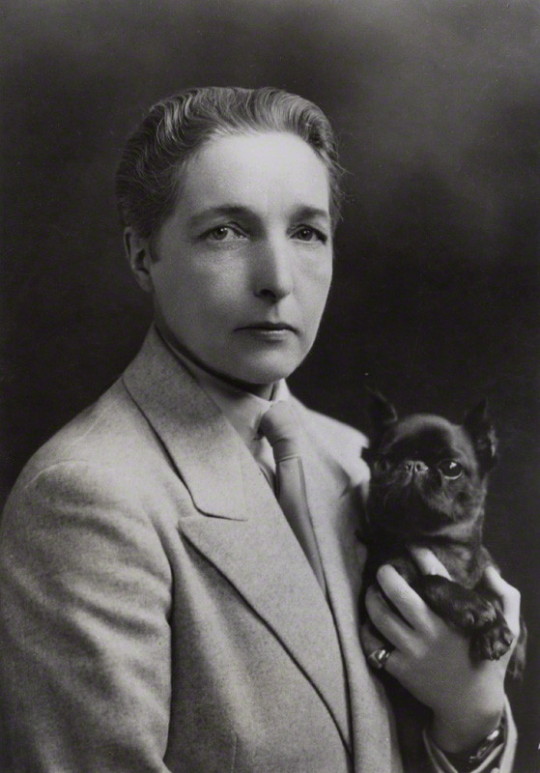
Neglected by her parents as a child, she studied at King's College London, then in Germany. She reached adulthood without a vocation, and spent a big part of her twenties in a series of relationships with women who later left her to marry.
In 1907, at the spa town of Bad Homburg in Germany, Marguerite met Mabel Batten, a lieder singer nicknamed Ladye, and the two fell in love. Batten was 51 at the time, with a husband, grown-up daughter and grandchildren. Hall was 27.
The two move in together when Mabel's husband dies. At the time, Marguerite was known for her "masculine" appearance and constant wearing of "masculine" clothes; Mabel Batten nicknamed her "John", a nickname she kept all her life.
In 1915, Radclyffe-Hall fell in love with Una Troubridge, a cousin of Mabel's whom she had known for 10 years. Battel died the following year, and in 1917, the two women moved in together. The two lived together until Hall's death, despite Hall's many affairs (that Troubridge painfully tolerated).
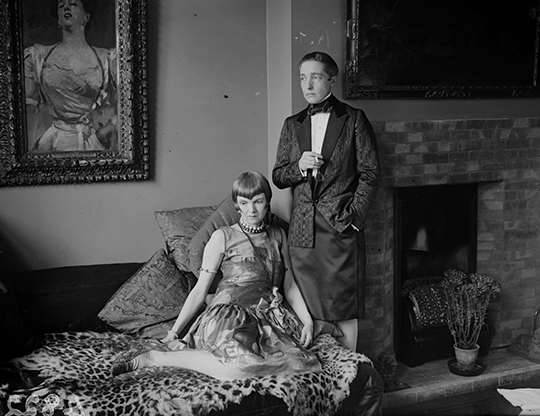
She has written eight novels and several poems.
Her first novel, "The Unit lamp", (1924) tells the story of a young girl who dreams of moving into a London apartment with her friend Elizabeth (a so-called "Boston marriage") and studying to become a doctor, but feels trapped by her emotionally-dependent, manipulative mother.
The novel's length and complexity made it difficult to sell, so Marguerite chose a lighter theme for her next novel, a social comedy : "The Forge". The book was quite successful this time.
Her next two novels were a great success, especially "Adam's Breed" (1926), which won the Prix Femina and the James Tait Black Award, something that had only been achieved once before.
But her best-known novel is "The Well of Loneliness". Published in 1928, it tells the story of a butch lesbian, from her childhood in England to her stay in Paris, where she becomes a famous writer. The novel was the subject of an obscenity trial in the UK (despite not being sexually explicit), resulting in the destruction of all copies. The USA authorized its publication after a long, long legal battle. Considered a classic, an extremely important work of lesbian literature, "The Well of Loneliness" was 7th on Publishing Triangle's 1999 list of the best gay novels.
In 1930, Hall won the gold medal of the Eichelbergher Humane Award. She was a member of the PEN club, the Council of the Society for Psychical and a member of the Zoological Society of London.
She died of colon cancer in 1943, aged 63. Her impact on literature, and lesbian literature in particular, remains significant to this day.
You can find the list of her novels (and more details about her life) here !
And some of her poems here :
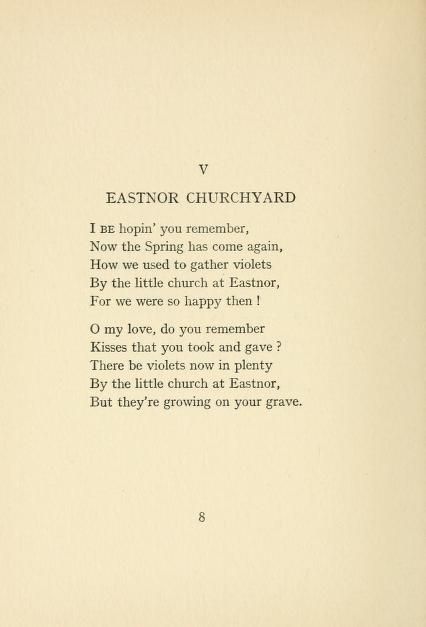
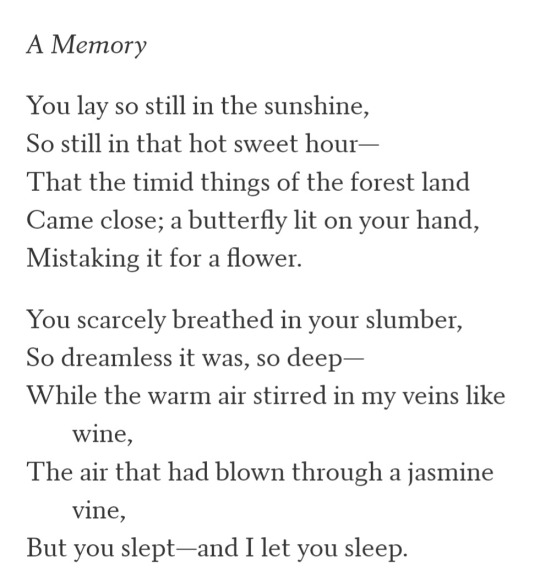
Hope you enjoyed, and see you tomorrow for the 5th post!
#lesbian#pride#pride month#lesbian pride#lesbian history#lesbian writer#lesbian poet#radclyffe hall#marguerite radclyffe-hall#butch lesbian#lgb history#female homosexuality#female homosexual#women's history#herstory
188 notes
·
View notes
Text
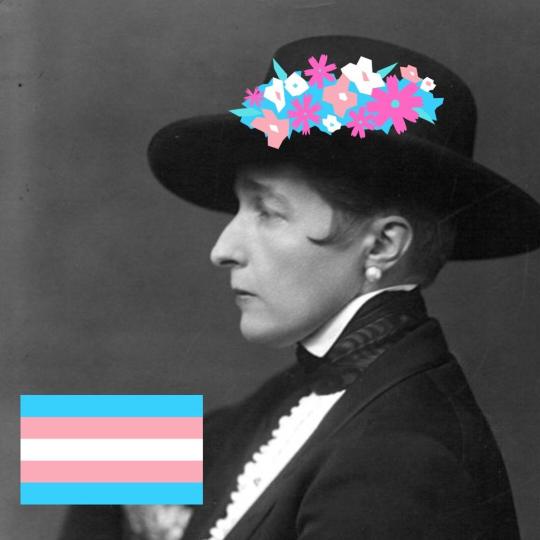


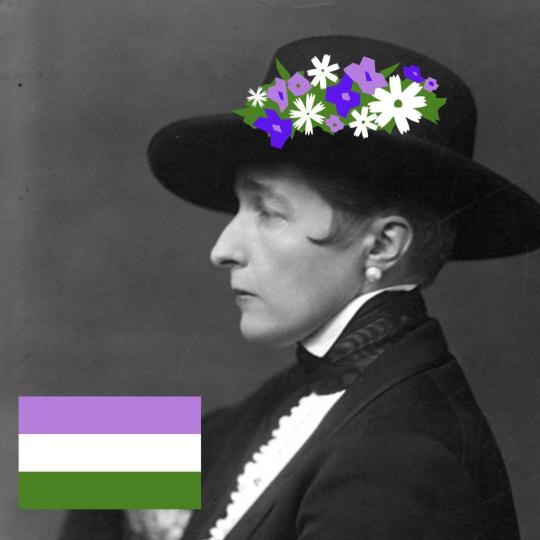
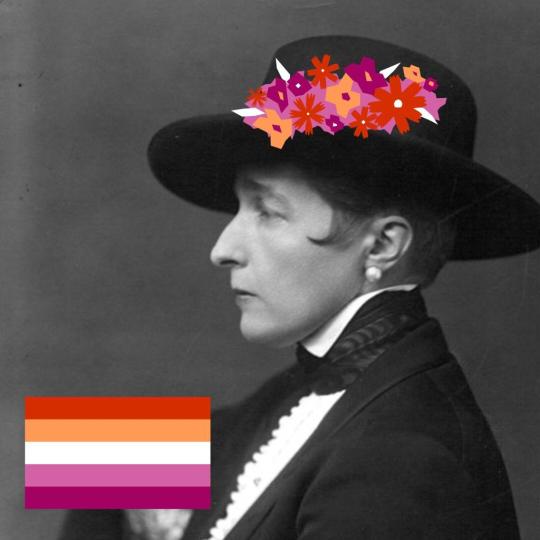
Radclyffe Hall (1880-1943)
born Marguerite Antonia Radclyffe Hall, but went by the name John on a daily basis
magnum opus: "The Well of Loneliness"
although Hall's person and work have been described as lesbian, "The Well" and Hall's behaviour were full of what we can now identify as transmasculine behaviour, with "The Well" focusing on the life of a writer resembling very much that of Hall
other works: "Adam's Breed", "The Unlit Lamp", "The Master of the House"
-
“For the sake of all the others who are like you, but less strong and less gifted perhaps, many of them, it's up to you to have the courage to make good.”
“Then Stephen must tell her the cruel truth, she must say: ‘I am one of those whom God marked on the forehead. Like Cain, I am marked and blemished. If you come to me, Mary, the world will abhor you, will persecute you, will call you unclean. Our love may be faithful even unto death and beyond — yet the world will call it unclean. We may harm no living creature by our love; we may grow more perfect in understanding and in charity because of our loving; but all this will not save you from the scourge of a world that will turn away its eyes from your noblest actions, finding only corruption and vileness in you. You will see men and women defiling each other, laying the burden of their sins upon their children. You will see unfaithfulness, lies and deceit among those whom the world views with approbation. You will find that many have grown hard of heart, have grown greedy, selfish, cruel and lustful; and then you will turn to me and will say: “You and I are more worthy of respect than these people. Why does the world persecute us, Stephen?” And I shall answer: “Because in this world there is only toleration for the so-called normal.” And when you come to me for protection, I shall say: “I cannot protect you, Mary, the world has deprived me of my right to protect; I am utterly helpless, I can only love you”.”
("The Well of Loneliness", Radclyffe Hall, 1928)
-
#the well is such a beautiful book please read it#the well of loneliness#radclyffe hall#literature#lgbtq authors#transgender#transmasc#lgbtq#non binary#classic authors#classic literature#british literature#queer history#queer literature#novels#books that absolutely ripped my heart out so i m recommending them to people >:)#skdsjlaljksla
15 notes
·
View notes
Note
o need to know in your opinion what books would regulus of tsf have in his tbr?
well he is currently reading the “heptaméron” and “le blé en herbe” but i’ll scrounge up some others i think he’d like? i haven’t read any of them but they seem like his vibe:
“the well of loneliness” by radclyffe hall
“the art of joy” by goliarda sapienza
the dune series ;)
“the promised land” by mary antin
“memoirs of hadrian” by marguerite yourcenar
“giovanni’s room” by james baldwin
4 notes
·
View notes
Text
UNA VINCENZO // SCULPTOR
“She was a British sculptor and translator. She is best known as the long-time lesbian partner of Marguerite Radclyffe Hall, author of The Well of Loneliness. She was an educated woman with achievements in her own right. Most notably she was a successful translator and introduced the French writer Colette to English readers. Her talent as a sculptor prompted Nijinsky to sit for her several times.”


1 note
·
View note
Text

She always Brooks her best
Romaine Brooks, Una, Lady Troubridge, 1924, Smithsonian American Art Museum
Una Vincenzo, Lady Troubridge (born Margot Elena Gertrude Taylor) was a British sculptor, translated the writings of Colette into English and was the long-time partner of Marguerite Radclyffe Hall, author of The Well of Loneliness.
#art history#art history memes#dad jokes#punny#puns#punsarelikeonions#art meme#women in art#women artists#museum nerd
1 note
·
View note
Quote
If our love is a sin, then heaven must be full of such tender and selfless sinning as ours.
The Well of Loneliness, by Radclyffe Hall
#page 177#the well of loneliness#well of loneliness#radclyffe hall#marguerite radclyffe-hall#stephen gordon#queer lit#lgbt#lesbian fiction#angela crossby#love#romance#sin#quote#quotes#literature#book#booklr#reading#fave#what a beautiful sentence this is#what a stunning linguist radclyffe hall was
63 notes
·
View notes
Photo

Marguerite Radclyffe Hall (deceased)
Gender: Female
Sexuality: Lesbian
DOB: 12 August 1880
RIP: 7 October 1943
Ethnicity: White
Occupation: Writer, poet
#Marguerite Radclyffe Hall#Radclyffe Hall#lgbt history#lesbian history#lgbt#female#lesbian#1880#rip#historical#white#writer#poet
44 notes
·
View notes
Photo

7 notes
·
View notes
Text
What I’m reading: 9/8/21
Wow, it’s been a while since I detailed what I’m reading today! It was my first day of teaching in-person. I have a nice, small class of students, and we are very congenial. Towards the point of the class, I read an essay on the arc of the personal essay, an intriguing piece about Radclyffe Hall’s trial for obscenity, as a result of The Well of Loneliness, and another piece on Virginia Woolf’s defense of Radclyffe Hall.
1. Picturing the Personal Essay: A Visual Guide This essay maps the arc of various personal essays in order to show how a story arc evolves.
2. The History and Legacy Surrounding "The Well of Loneliness," the First Lesbian Novel to Be Published in the United States and Britain This PBS essay discusses the publication history of The Well of Loneliness -and the discovery of a first edition on Antiques Roadshow.
3. November 9, 1928: The Trial of Radclyffe Hall and Virginia Woolf’s Exquisite Case for the Freedom of Speech Hard to describe this article. Here’s a tasty excerpt for your reading enjoyment.
Hall, born Marguerite Radclyffe Hall but known to her loved ones as John, was an out lesbian who dressed in men’s clothes in a society and era when same-sex love was considered not only immoral but legally punishable. In the spring of 1928, encouraged by the success of her previous writings, Hall warned her publisher, Jonathan Cape, that her next book would require a high degree of faith on his behalf, for she was taking a great personal and cultural risk. “I have put my pen at the service of some of the most persecuted and misunderstood people in the world,” she wrote to him in a letter cited in Sally Cline’s biography Radclyffe Hall: A Woman Called John (public library). “So far as I know nothing of the kind has ever been attempted before in fiction,” she added.
I hope you enjoyed reading along with me!
6 notes
·
View notes
Text
dark academia movies + books:
this post is from my personal tbr and to watch lists so i haven’t seen and read everything on this list but most are talked about in the dark academia community, it’ll help you understand the aesthetic better/immerse yourself in it. also some of the movies are absolute rubbish but they’re nice to laugh at so :) enjoy
movies:
loving vincent (2017)
only lovers left alive (2013)
the dreamers (2003)
mary shelley (2017)
wilde (1997)
wuthering heights (1992)
the beguiled (2017)
picnic at hanging rock (1975)
another country (1984)
the riot club (2014)
the oxford murders (2008)
kill your darlings (2013)
dead poets society (1989)
stoker (2013)
the talented mr. ripley (1999)
little women (2019)
portrait of a lady on fire (2019)
the goldfinch (2019)
maurice (1987)
the picture of dorian gray (do Not watch the 2009 one, it is very cursed)
books:
paradise lost by john milton
if we were villains by m. l. rio
the secret history by donna tartt
the goldfinch by donna tartt
the little friend by donna tartt
the picture of dorian gray by oscar wilde
the strange case of dr jekyll and mr hyde by robert louis stevenson
killing commendatore by haruki murakami
the bell jar by sylvia plath
ariel by sylvia plath
the book of disquiet by fernando pessoa
inferno by dante
who killed mr. chippendale by mel glenn
and then there were none by agatha christie
the winter of our discontent by john steinback
the lake of dead languages by carol goodman
wuthering heights by emily brontë
the master and margarita by mikhail bulgakov
brideshead revisited by evelyn waugh
the song of achilles by madeline miller
circe by madeline miller
a separate peace by john knowles
the well of loneliness by radclyffe hall
maurice by e. m. forster
among the bohemians by virginia nicholson
jonathan strange and mr norrell by susanna clarke
the greek myths by robert graves*
the twelve olympians by charles seltman*
mythos by stephen fry*
heroes by stephen fry*
the count of monte cristo by alexandre dumas
the magicians trilogy by lev grossman
ninth house by leigh bardugo
interview with the vampire by anne rice
the talented mr. ripley by partricia highsmith
lords and ladies by sir terry pratchett
memoirs of hadrian by marguerite yourcenar
spqr: a history of ancient rome by mary beard*
homosexuality and civilisation by louis crompton*
house of leaves by mark z. danielewski
the iliad by homer
odyssey by homer
metamorphoses by ovid
the oresteia by aeschylus
*these books are more like research sources
if you want more specific lists like gothic books, mystery books, magic/fantasy related, etc. let me know!
#dark academica#dark academia aesthetic#light academia#light academia aesthetic#books#movies#classics#classic literature#literature#academia aesthetic
275 notes
·
View notes
Text
Today in LGBTQ+ History
July 27
(1899) Henry James, an American-born English author and a key figure in 19th century literary realism, came out in a letter to Henrik V. Anderson.
(1928) Marguerite Radclyffe Hall's The Well of Loneliness is published in the UK. It is renowned as a groundbreaking work of lesbian literature, referred to as the first novel that portrayed lesbianism as natural.
(1940) The Rev., founder of the Metropolitan Community Church, is born. The Metropolitan Community Church, formed in Los Angeles on Oct 6, 1968, boasts the first special affirming ministry for LGBTQ+ persons.
(1967) Britain decriminalizes homosexuality with the caveat that no public displays take place. The new law makes the age of consent 21.
(1969) The Gay Liberation Front organizes a protest against police harassment.
(1978) New Jersey repeals its sodomy laws.
(1982) At a meeting between gay community leaders, federal bureaucrats, and the CDC, it was proposed that GRID (gay-related immunodeficiency) be changed to AIDS (acquired immunodeficiency syndrome) in order to reflect that it wasn't a sexuality-specific illness.
(1987) A tribute to Dr. Tom Waddell, Olympic decathelete and the organizer of the Gay Games, is published in Sports Illustrated. He died of AIDS complications not long prior. During his life, besides founding the Gay Games, he was a physician specializing in infectious diseases, a US Army paratrooper, the private physician of the brother of the King of Saudi Arabia, a gymnastics champion at Springfield college, and the first gay man to be featured with his partner in the "couples" section of People magazine.
(1988) Army private Adrian Morris Jr. was found guilty of sodomy and discrediting the military for having had sex with a man. He received a $1200 fine and a bad conduct discharge.
(2001) Houston's city council passes an ordinance outlawing discrimination against gays and lesbians in employment decisions.
(2011) Osvaldo Ramon Lopez becomes the first openly gay congressman in Argentina.
(2015) 1. World champion power lifter Janae Marie Kroc (fka Matt Kroczaleski) comes out as trans and genderfluid. She is a Physique Committee bodybuilder, though her performance dropped after beggining hormone therapy.
2. The Boy Scouts of America removed an archaic rule that barred gay people from being troop leaders or other employees.
#lgbt#lgbtq#lgbtqia#lgbt history#lgbtq history#lgbtqia history#gay#lesbian#bisexual#transgender#boy scouts#argentina#sodomy#sodomy laws#aids#gay liberation front#metropolitan community church#akron lgbt#akron lgbtqia#akron lgbtq
12 notes
·
View notes
Note
What are your favorite love stories, in any (all) sense(s)?
The deviant ones. Grotesque, frenetic, unrequited, heretical love. Love that stretches across space and time and centuries. Love as obsession, as delusion, as homicide. Like Sarah Kane’s ‘Cleansed’ - “either love me or kill me.” Stories like those, I suppose.
Exempli gratia:
The novels of Patrick McGrathThe plays of Sarah KaneMary Renault's Alexander trilogyAngela Carter, The Bloody Chamber & Other StoriesAndrew Davidson, The GargoyleDavid Mitchell, Cloud AtlasEmily Brontë, Wuthering HeightsOrhan Pamuk, The Museum of InnocenceElfriede Jelinek, The Piano TeacherMadeline Miller, The Song of AchillesJohn Banville, AthenaLeo Tolstoy, Anna KareninaLeo Tolstoy, The Kreutzer SonataJames Baldwin, Giovanni’s RoomPatricia Highsmith, The Sweet SicknessAndre Aciman, Call Me By Your NameCharlotte Brontë, Jane EyreAnaïs Nin and Henry Miller, Henry and June Poppy Brite, Exquisite CorpseRadclyffe Hall, The Well of LonelinessMarguerite Duras, L'amantKazuo Ishiguro, The Remains of the DayGabriel Garcia Marquez, Love in the Time of CholeraPatrick Süskind, PerfumeElizabeth Knox, The Vintner’s LuckYukio Mishima, The Frolic of the BeastsRaymond Radiguet, The Devil in the FleshMilan Kundera, L'identitéErnesto Sabato, The Tunnel
408 notes
·
View notes
Text
“The Well of Loneliness,” Marguerite Radclyffe-Hall
Just a few pages into this book I had to double-check the publication date because I couldn’t believe anything this explicitly queer would be published in the 20s. It was when I read “all in a moment Stephen knew that she loved her—a staggering revelation!” (11), in reference to Stephen realizing her attraction to Collins. But even before that, when Sir Philip decided to keep calling his daughter Stephen, I was surprised because this seems so different from other novels I’ve read from this time period—it seems like it wouldn’t have been allowed or that the characters would have faced more pushback about the name, but everyone seems to accept it pretty easily.
Whether Stephen is intended to be a lesbian or perhaps a trans man is unclear thus far in the book, but I was interested a lot in Sir Philip’s character. Whereas the parents in other works we have seen so far have gone out of their way to convince themselves that their daughters were not gay, I thought it was interesting that Stephen’s father goes out of his way to read works of Karl Heinrich Ulrichs who sounded familiar and according to Google was a “German writer and pioneer of modern gay rights.” It seems like Sir Philip is aware even at Stephen’s young age that she is different, and he listens to and I believe understands her feelings of attraction towards Collins. And by reading and taking notes on Ulrichs’ writings I think he is making more of an effort to understand his daughter and treats her more kindly rather than distancing himself from her or being disgusted by what her feelings might be. He also allows Stephen to ride her pony astride rather than sidesaddle and to participate in more masculine activities like hunting with him and his friends and their sons. Honestly, based on these actions, he is a real straight ally here.
And yet he withholds this information or his suspicions from his wife, at first I thought because he was afraid to maybe further damage the already tenuous and distant relationship that Anna and Stephen have, but then on page 61 when Sir Philip continues to not tell Anna about what he knows or suspects about Stephen, this is described as “the first cowardly action of his life,” and it is explained that he feels that imparting this information upon Anna would cause her pain or shame of some sort. And this omission of information is described also as a sin against Stephen. I wonder if it would be better for him to share with Anna so that she could come to terms with and better understand her daughter and her sexuality, or if it would be better for him to leave it to Stephen to figure out and share her feelings with her mother on her own terms. Overall I think the parent/child dynamic in this book is different from anything we have seen so far in the course and I think it will be interesting to see how it evolves over the course of the novel.
0 notes
Note
4, 13, 14, 22 for both Farah and Clair please!
4. What is their favorite book?
Claire:
Although she’s not an avid reader, Claire loves classic science fiction novels. Her favorite is The Time Machine by H.G. Wells. (Yup, there’s symbolism in that choice.)
Farah:
It’s true Farah reads a lot of (auto)biographies and other nonfiction books, but her guilty pleasure is romance novels. Her favorite is The Well of Loneliness by Marguerite Radclyffe-Hall.
13. What are their spending habits?
Claire:
Frugal. Claire knows how to stretch a dollar (or bottlecap). She’d buy clothes at thrift stores and alter/repair them herself, cut out coupons, rely on sales, make her own gifts and holiday decorations, and she didn’t even have a credit card until she was out of the military. Claire haggles a lot, and she likes the Commonwealth economy relies on bartering as much as spending.
Farah:
A touch on the frivolous side. Farah never had to worry about anything in the Institute. Credits were added to everyone’s accounts each week, and the amount was more than enough to maintain a comfortable lifestyle. But in the Commonwealth, Farah has to learn to save money and live on a budget. She has access to things never found in the Institute, and it’s hard to pass up on anything she finds cute.
14. Do they like hot or cold temperatures better?
Claire:
She’ll always love hot weather/temperatures the most. Being inside the cryo-pod for 210 years made her resilient to cold temperatures, but she still hates the winter season. Especially the snow.
Farah:
Again, changes in the seasons is something Farah is unfamiliar with. She enjoys the spring and the autumn, when it isn’t too hot or too cold, BUT. Farah falls in love with winter when she sees her first snowfall.
22. How do they react to criticism?
Claire:
It depends on the person giving her the criticism. Years in the military helped her learn discipline and to remain calm and level-headed in stressful situations, but she still has a problem with authority figures. If the criticism is coming from a superior, it’s a very hard pill for Claire to swallow.
Farah:
Not as well as people assume. Farah listens to criticism and takes it into consideration. But her parents were very critical and more controlling than she realized when growing up. Farah will shrink into herself if just the “right” thing is said, but she hides it well and most people don’t notice when it bothers her.
1 note
·
View note
Text
RADCLYFFE HALL // POET
“She was an English poet and author, known for the novel The Well of Loneliness, a groundbreaking work in lesbian literature. In adulthood, Hall often went by the name John, rather than Marguerite.”


0 notes
Photo
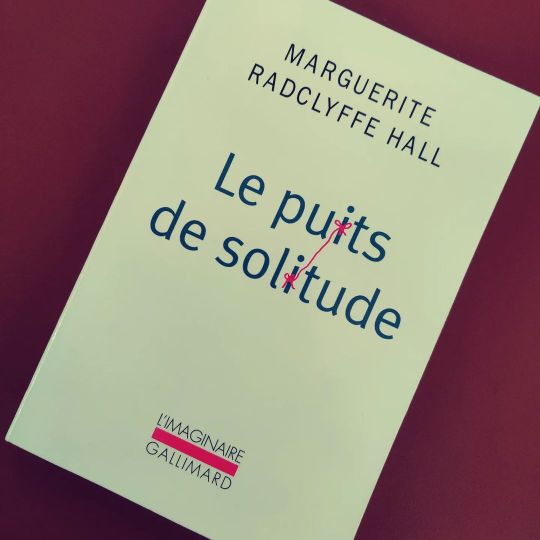
J’ai lu Le Puits de Solitude de Marguerite Radclyffe-Hall. L’auteure nous livre l’histoire de Stephen Gordon une personnalité hors-norme pour son époque qui doit lutter pour se faire accepter et espérer être heureuse. L’histoire est quelque peu datée, mais, en même temps, elle a été publiée en 1928, mais trouve quand même un certain écho avec notre société moderne.
#lepuitsdesolitude#margueriteradclyffehall#radclyffehall#thewellofloneliness#livre#roman#lecture#litterature#litteraturebritannique#litteratureanglaise#litteraturelesbienne#autrice#ecrivaine#auteure#limaginairegallimard#livrestagram#lgbt#lgbtqfiction#lgbtfiction#lgbtq#instalivre#instalecture#book#bookstagram#lire#read#reading
1 note
·
View note